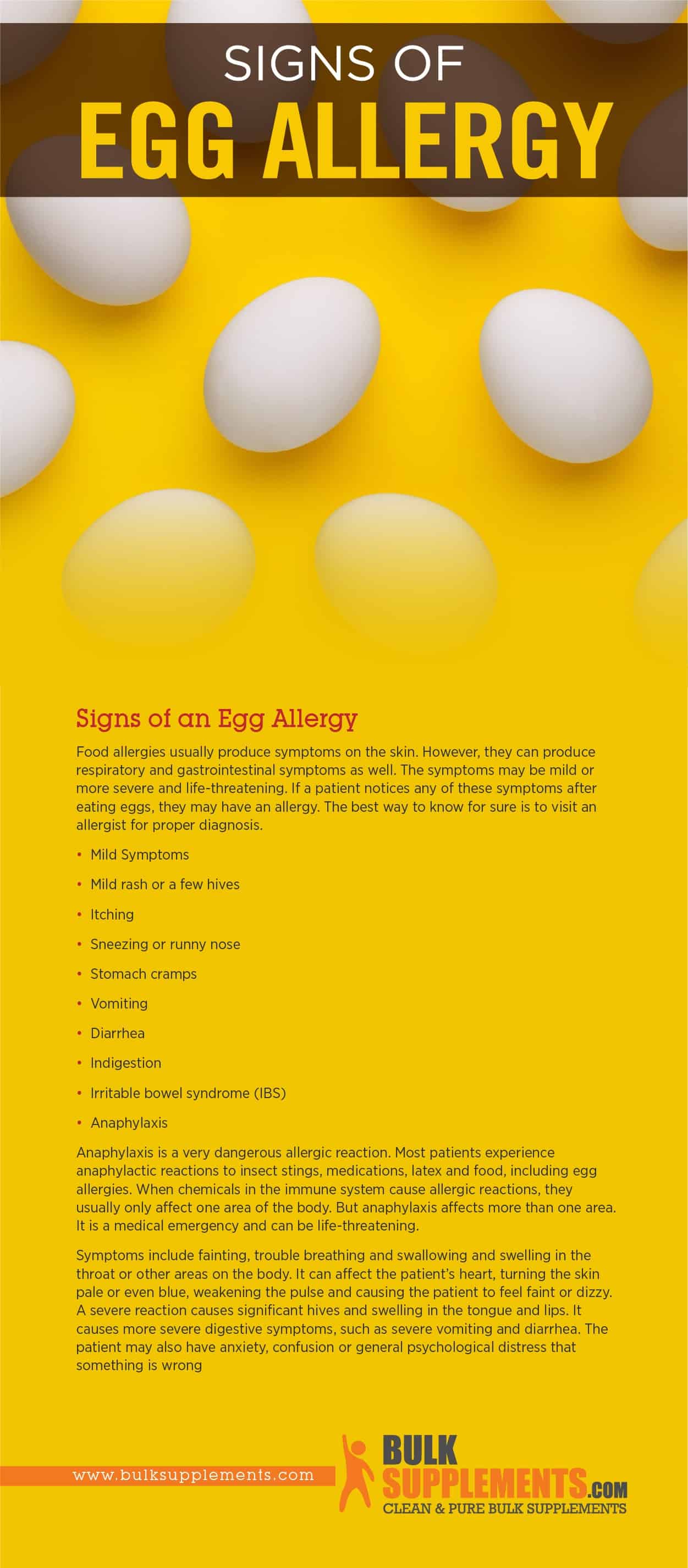Egg Allergy: Causes, Signs & Treatment
by James Denlinger Digital Marketing Strategist
What is an Egg Allergy?
If a patient gets a rash, runny nose or watery eyes after eating eggs or foods that contain eggs, they probably have an egg allergy. An egg allergy is caused by an overactive immune system response to the proteins in egg whites or egg yolks. If the immune system is sensitive to eggs, it treats egg proteins like a disease. The body produces chemicals in response, to destroy the proteins, which trigger an allergic reaction.
Allergy researchers hypothesize that roughly 2 percent of children have an egg allergy. However, about 70 percent will likely outgrow the egg allergy by age 16 (x). Allergic reactions to eggs can range from a mildly annoying rash to fatal anaphylactic shock. Anaphylaxis can occur as a secondary allergic reaction. That is, it can manifest hours after the primary symptoms appear—such as a rash or an upset stomach.
If a patient has an allergic reaction to chicken eggs, then they are most likely at risk of allergies from other bird eggs, including duck, turkey, quail and goose eggs. It’s possible to have an egg allergy and still be able to safely eat baked goods. Although if a patient has ever had a serious reaction to eggs, experts recommend that they avoid baked goods.
Food Allergy vs. Food Intolerance
Even though food intolerance and food allergies are often used interchangeably, a food sensitivity or food intolerance is not synonymous with a food allergy. A food allergy takes place in the immune system and usually the symptoms appear on the skin. A food intolerance takes place in the digestive system. It can cause gastrointestinal distress, including flatulence, stomach pain, bloating, diarrhea and even vomiting.
A food allergy can potentially provoke an extreme and life-threatening reaction from the body’s immune system. A patient can go into anaphylactic shock if they touch or even inhale the food. In contrast, a food sensitivity or intolerance does not activate the immune system and is not considered life-threatening. Food allergies and food intolerance can cause similar symptoms, particularly respiratory symptoms. However, patients will not have these symptoms on their own, but along with skin or gastrointestinal symptoms.
Signs of an Egg Allergy
Food allergies usually produce symptoms on the skin. However, they can produce respiratory and gastrointestinal symptoms as well. The symptoms may be mild or more severe and life-threatening. If a patient notices any of these symptoms after eating eggs, they may have an allergy. The best way to know for sure is to visit an allergist for proper diagnosis.
Mild Symptoms
- Mild rash or a few hives
- Itching
- Sneezing or runny nose
- Stomach cramps
- Vomiting
- Diarrhea
- Indigestion
- Irritable bowel syndrome (IBS)
Anaphylaxis
Anaphylaxis is a very dangerous allergic reaction. Most patients experience anaphylactic reactions to insect stings, medications, latex and food, including egg allergies. When chemicals in the immune system cause allergic reactions, they usually only affect one area of the body. But anaphylaxis affects more than one area. It is a medical emergency and can be life-threatening.
Symptoms include fainting, trouble breathing and swallowing and swelling in the throat or other areas on the body. It can affect the patient’s heart, turning the skin pale or even blue, weakening the pulse and causing the patient to feel faint or dizzy. A severe reaction causes significant hives and swelling in the tongue and lips. It causes more severe digestive symptoms, such as severe vomiting and diarrhea. The patient may also have anxiety, confusion or general psychological distress that something is wrong.

Causes of an Egg Allergy
In an egg allergy, the immune system misidentifies eggs and egg proteins as infectious invaders. It produces an excess amount of a chemical called histamine, which causes allergy symptoms. It is the immune’s system hyper-response that causes the egg allergy symptoms in order to protect the body from harm.
Researchers have not concluded exactly what causes the immune system to make this mistake. However, allergies can run in families. If a person has a family history of allergies, it increases the likelihood that they will have an allergy. Research states that there is a connection between food allergies and other immune system conditions caused by hypersensitive immune systems, such as eczema and hay fever.
Diagnosing an Egg Allergy
An allergist can make accurate diagnosis of an egg allergy with a blood test or a skin-prick test. In a skin-prick test, the allergist will place a liquid containing a small amount of egg protein onto the patient’s back or arm. The allergist then uses a probe to lightly prick the skin and insert the liquid into the skin. If the patient has an egg allergy, it will cause a red, raised bump or spot to form, usually in 15 to 20 minutes. A skin-prick test can indicate if the patient is allergic to egg whites or egg yolk proteins depending on which protein the allergist uses. A blood test records whether the immune system produces immunoglobulin E antibodies as a response to egg proteins.
Managing an Egg Allergy
Avoiding Eggs and Egg Products in Food
Avoiding eggs and egg products is the best way to avoid triggering an allergic reaction. However, it is not easy to avoid an allergen. Eggs are a common allergen and they are also a very common food ingredient. Patients with egg allergies should take extra caution and read food product labels and ingredients. It is also important to be able to identify any other names that the allergen may have.
For example, patients with egg allergies should avoid ingredients like surimi, meringue, ovalbumin, mayonnaise, lysozyme and albumin. There may also be food sources that a patient may not expect to contain eggs, such as pasta, pretzels and specialty coffee drinks.
Egg substitutes for cooking are plentiful. However, it is still important to use caution because not all egg substitutes are safe for those with egg allergies. Some egg substitutes contain small amounts of egg proteins in them. Some patients can tolerate baked goods that contain eggs, but it is best to consult an allergist for confirmation.
Treating Allergy Symptoms
If a patient has a mild allergic reaction, they can use antihistamines to treat the symptoms. Also called H1 blockers, they can block histamine that the body releases in response to an allergen.
However, antihistamines will not protect against a more severe anaphylactic reaction. Anaphylaxis can be fatal and the only way to treat it is with epinephrine. Patients can carry the medication in an injector. Sometimes allergists recommend that a patient use the medication for mild reactions or before the symptoms even start to appear. The patient should inject the medication as soon as they show signs of a severe reaction, call 911 and go to the emergency room. The patient may need further treatment even after the epinephrine.
Vaccinations with Egg Allergy
Modern flu vaccines are usually safe for patients with egg allergies. However, some vaccines contain traces of egg proteins that may trigger an allergic reaction. Chances of a life-threatening reaction are very low, but it is still important to use caution.
Flu (influenza) vaccines contain small amounts of egg protein, but they are generally safe for patients with an allergy. A doctor or allergist can determine if a patient’s condition requires a specially tailored flu vaccine, although that is rare.
Measles–mumps-rubella (MMR) vaccines are safe for children with an egg allergy, even a severe egg allergy. The vaccines are grown in chick tissues, not in eggs, so they do not contain egg proteins.
The yellow fever vaccine is one of the few vaccines that may trigger allergic reactions in patients with an egg allergy. However, the vaccine is safe with proper precautions.
Supplements for Egg Intolerance & Digestive Health
No supplement can cure or prevent an egg allergy. Homeopathic remedies may be suitable for many different conditions, but an egg allergy isn’t one of them. There are, however, some great supplements for digestive health that can reduce the symptoms that an egg or other food intolerance may cause.
Peppermint
Peppermint isn’t just tasty. It’s also a traditional remedy that promotes good digestive health. In small doses, it calms tissues of the large and small intestines. It may help treat IBS, nausea, constipation and diarrhea, as well as bloating and gas. As a dietary supplement, take 700 mg (⅓ tsp) of peppermint extract powder once or twice a day, after consulting a doctor.
Ginger
Ginger has a long history of treating stomach and nausea that dates back thousands of years and with good reason. Research claims that ginger is an effective anti-inflammatory that shrinks swollen, irritated tissues in the body. It also soothes an upset stomach and helps with digestion. As a dietary supplement, the recommended dosage for ginger root extract powder is 1,000 mg once daily with at least 8 oz. of water, or as directed by a physician.
Glutamine
Glutamine is an abundant amino acid in the body. It helps benefit the health of the mucous membrane within the intestines, which reduces spasticity in the colon. In turn, this relief reduces irritable bowel syndrome symptoms. Glutamine has been shown to help the intestines heal. As a dietary supplement, take 500 mg (about ¼ tsp) to 1,000 mg (about ½ tsp) of N-acetyl L-glutamine three times a day, preferably on an empty stomach. Consult a physician before taking this supplement.
Psyllium Husk
From a plant called plantago ovata, psyllium husk grows all over the world, but it mainly grows in India. It is a natural soluble fiber and a laxative. It can increase the size of stool to treat constipation and eases diarrhea by absorbing water and thickening the stool. The recommended dosage for psyllium husk as a dietary supplement is 5 g up to three times a day with at least 8 oz. of water, unless a doctor recommends a different dosage.
The Bottom Line
An egg allergy is an immune response to egg protein. The immune system mistakes the proteins for a harmful invader and releases chemicals that cause an allergic reaction. The symptoms can range from mildly uncomfortable to severe and potentially lethal. The symptoms of a mild egg allergy may include a mild rash, upset stomach, runny nose and hives. More severe symptoms can cause serious swelling on the tongue and lips, trouble breathing, pale skin and weak pulse. This is called anaphylaxis and it can be life-threatening. Visit an allergist to confirm an egg allergy with a skin or blood test.
There is no cure for food allergies, but patients can treat and manage the symptoms. Treatment options include antihistamines for mild symptoms and an epinephrine injection for severe anaphylactic reactions. Supplements can also help patients manage digestive symptoms that result from egg allergy. They are not designed to treat any medical condition, only to improve general health.
Sponsor Ads
Created on Mar 5th 2020 16:45. Viewed 639 times.



